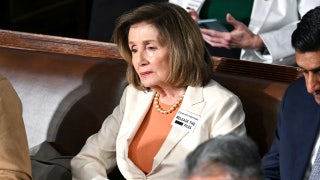New York Times guild leaders list demands, speak out during walkout rally
NewsGuild leaders and New York Times employees suggested further action if the paper does not negotiate in good faith.
New York Times employees conducted a one-day strike Thursday as the NewsGuild refused to work, claiming employee evaluations discriminate against minorities and demanding pay increases and a salary floor.
A massive rally took place directly outside the 40th Street entrance of the Times’ midtown Manhattan headquarters. Guild members wore red in solidarity, held up "New York Times Walks Out" signs and Scabby, the giant inflatable rat synonymous with union drama, was on hand. The fiery crowd of disgruntled Times employees heard directly from union leaders such as "1619 Project" architect Nikole Hannah-Jones and NewsGuild chief Susan DeCarava after 20 months of tension over failed negotiations finally forced a walk-out.
"The goal is to show our company that we’re serious, that we deserve to be treated respectfully at the bargaining table," Hannah-Jones told Fox News Digital moments before she addressed the crowd.
"It’s really important for me to come and show solidarity, particularly with our lower-wage workers," Hannah-Jones continued. "We haven’t seen raises in two years and some of our members are really struggling to make ends meet to work here and live in the city. So, we want to show how serious we are about getting a fair contract."
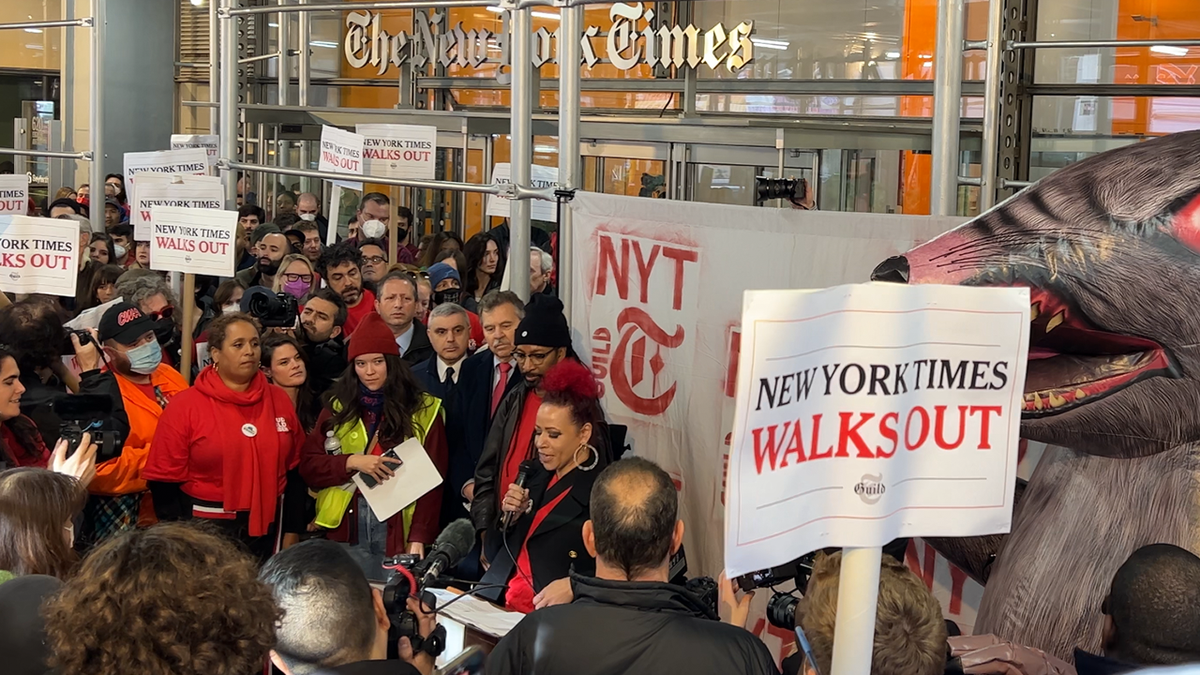
1619 Project Founder and Racial Injustice Reporter for The New York Times Nikole Hannah-Jones speaks at the New York Times walkout on December 8, 2022. (Fox News Digital )
Hannah-Jones, arguably the paper’s most recognizable and outspoken staffer, said morale is low at the Gray Lady after 20 months of failed negotiations, as rank-and-file staffers want the paper to thrive but don’t feel appreciated.
"I think that people are really disappointed," Hannah-Jones said. "You don’t get to a step like this if you don’t feel that disappointment."
When the rally officially began Thursday afternoon, protestors and journalists covering the event packed around a makeshift NYT Guild backdrop and wooden podium. Photographers climbed scaffolding to get better pictures, and publisher A.G. Sulzberger was taunted with a chant mocking a promotional lunchbox recently handed out to employees. One staffer, who claimed he was recently gifted a New York Times tote bag, said "I don’t need knickknacks, I need a raise."
DeCarava, the president of the NewsGuild of New York, believes Times’ employee reviews discriminate against Black workers after the paper’s data reporters examined the results of internal evaluations.
"It turns out that they are weighted against employees of color at the New York Times. For example, no Black employee at the New York Times has ever received the highest rating possible. Nikole Hannah-Jones is in our unit. Tell me how she is not doing that caliber type of work," DeCarava told Fox News Digital after the rally with chants still echoing in the background.
THE NEW YORK TIMES JOURNEY FROM PAPER OF RECORD TO HOME OF THE 1619 PROJECT
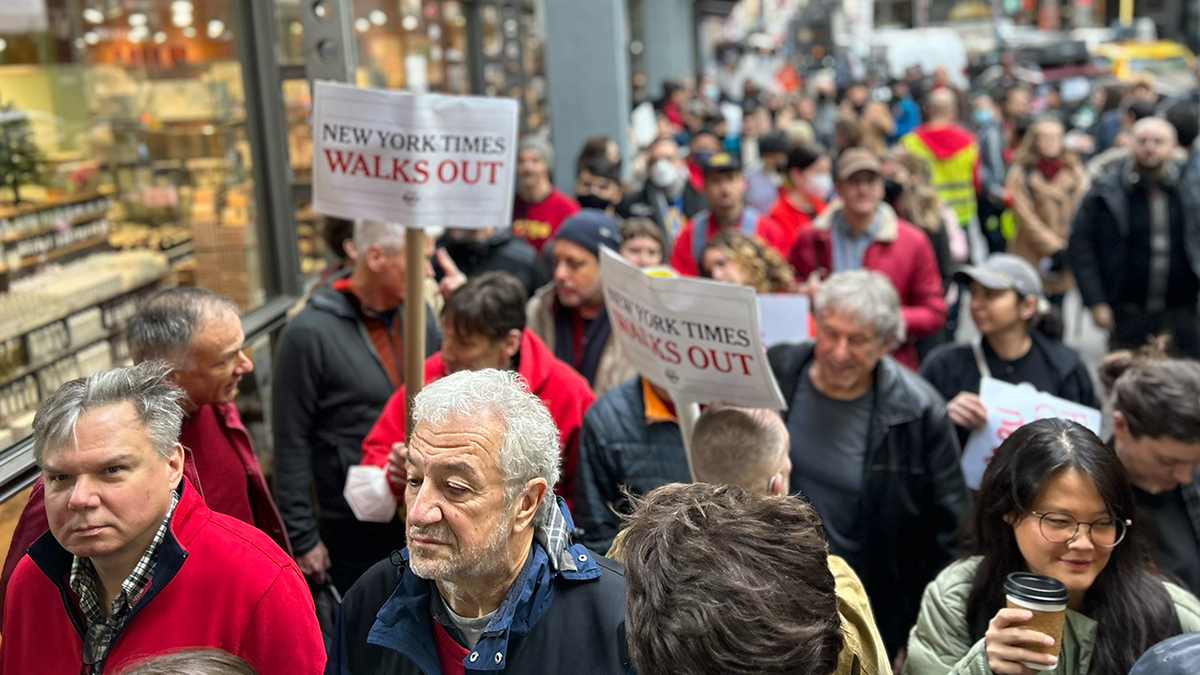
The crowd for the New York Times walkout in New York City pours out down the sidewalk on 40th St. (Fox News Digital )
"We have multiple people every day who do fantastic work, who deliver the news for the Times and don’t get recognized for it," DeCarava continued. "It’s about respect, it’s also about compensation."
DeCarava said discretionary pay increases are dependent on internal evaluations, and therefore Black staffers aren’t getting raises they feel are deserved.
"It’s a double whammy, right? What is your reputation within the newsroom, how are you regarded by supervisors, editors, by your peers, and how are you compensated for it," DeCarava said. "That’s one of the reasons why we’re fighting so hard to have a compensation system that recognizes two years without pay [increases] but that also takes much of the discretion of the hands of a biased system."
DeCarava, who is pushing for a more "regulated" system in which "everyone is guaranteed a raise" on an annual basis, doesn’t feel the paper is bargaining sincerely.
"I do not," she said when asked if she believed Times management was operating in good faith.
"We’ve seen a tremendous amount of support from our readership, which we’re really grateful for," she said. "We want the Times to care as much about the quality of our work as they do."
NEW YORK TIMES UNION CALLS ON READERS TO JOIN ‘DIGITAL PICKET LINE' AS STRIKE BEGINS
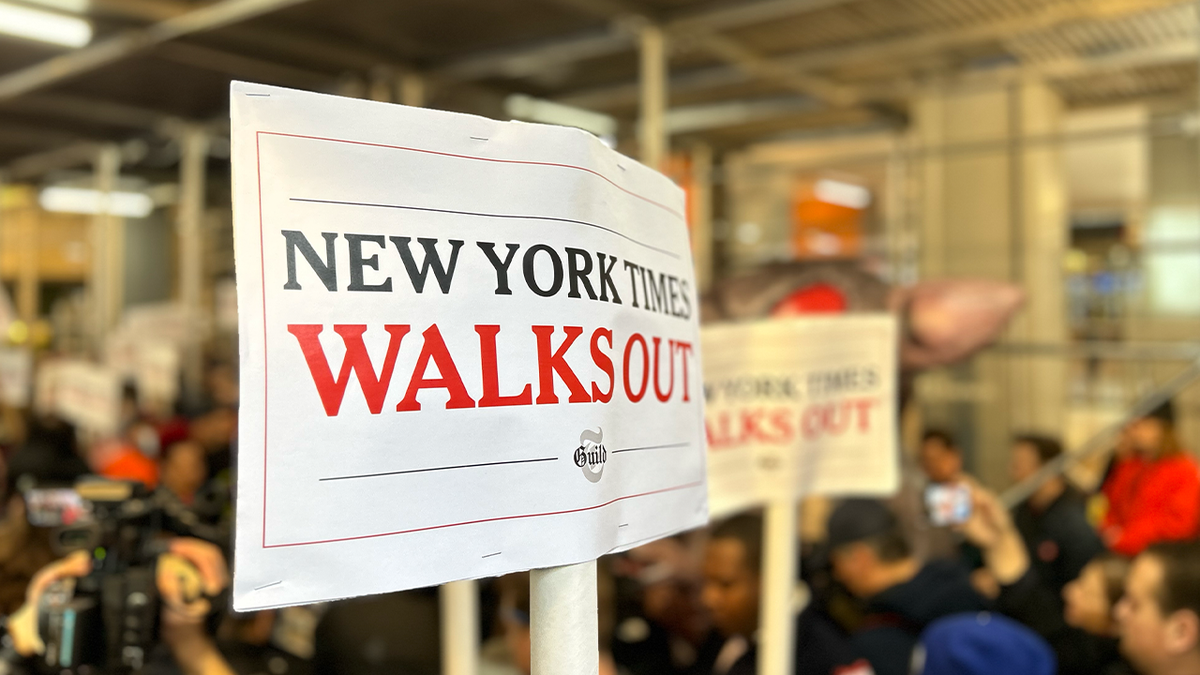
A sign for The New York Times walkout in New York City on December 8, 2022. (Fox News Digital )
Guild unit chair Bill Baker was "pleased" with the rally turnout but also criticized the paper's leadership.
"The fact that we’re here 20 months later, I can’t say that they’ve been operating in good faith," Baker told Fox News Digital. "We should have been done a long time ago."
Baker said the union has made concessions in previous bargaining sessions because the paper was struggling at the time. But since fortunes have changed for the better and the Times has recently made splashy acquisitions like buying Wordle and The Athletic, he wants to feel the love.
"We should be reciprocated, not only for [past] concessions, but for the work that we’ve done to make the company [what] it is now," Baker said.
Times finance reporter Stacy Cowley, who sits on the Guild’s bargaining committee, feels wages that coincide with inflation and a living wage for all members of the Guild are the two most critical issues for her group.
ELON MUSK RIPS NEW YORK TIMES ARTICLE AS ‘UTTERLY FALSE' FOR CLAIMING MAJOR RISE IN HATE SPEECH
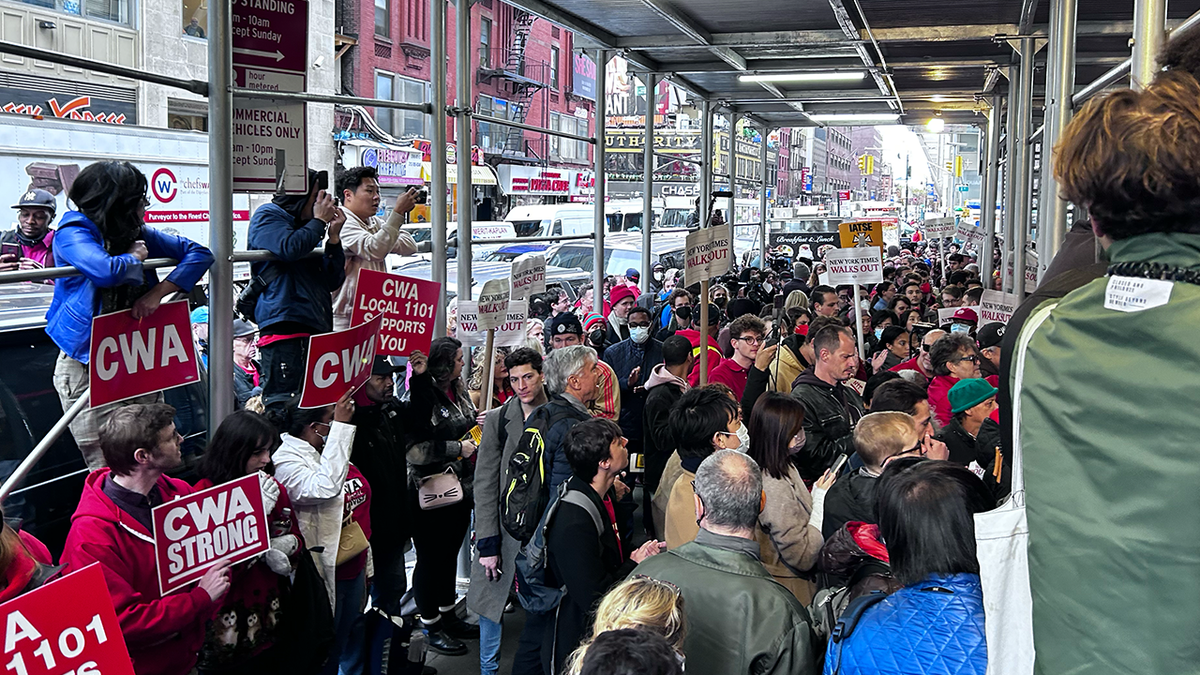
People in New York City join the New York Times walkout pushing for better wages, benefits, and treatment by the company. (Fox News Digital )
New York Times management has complained in the press that the Guild doesn’t want to negotiate in person, as the union prefers Zoom sessions so that all members can witness the bargaining attempts, but Cowley vehemently disagrees.
"We believe, really firmly, that these negotiations should not be conducted behind closed doors," Cowley said. "We believe all of our members ae entitled to see the sausage getting made."
Cowley said further negotiations aren’t scheduled until Tuesday, but she’s willing to speak at any moment.
"We are going to continue doing everything we can to get a deal done. If the Times continues to give up proposals that are completely unacceptable, I think you’ve seen today the force of our collective will," Cowley said.
NEW YORK TIMES ARGUES THE REPUBLICAN PARTY ‘ENABLES POLITICAL VIOLENCE,’ DOWNPLAYS LEFT-WING ATTACKS
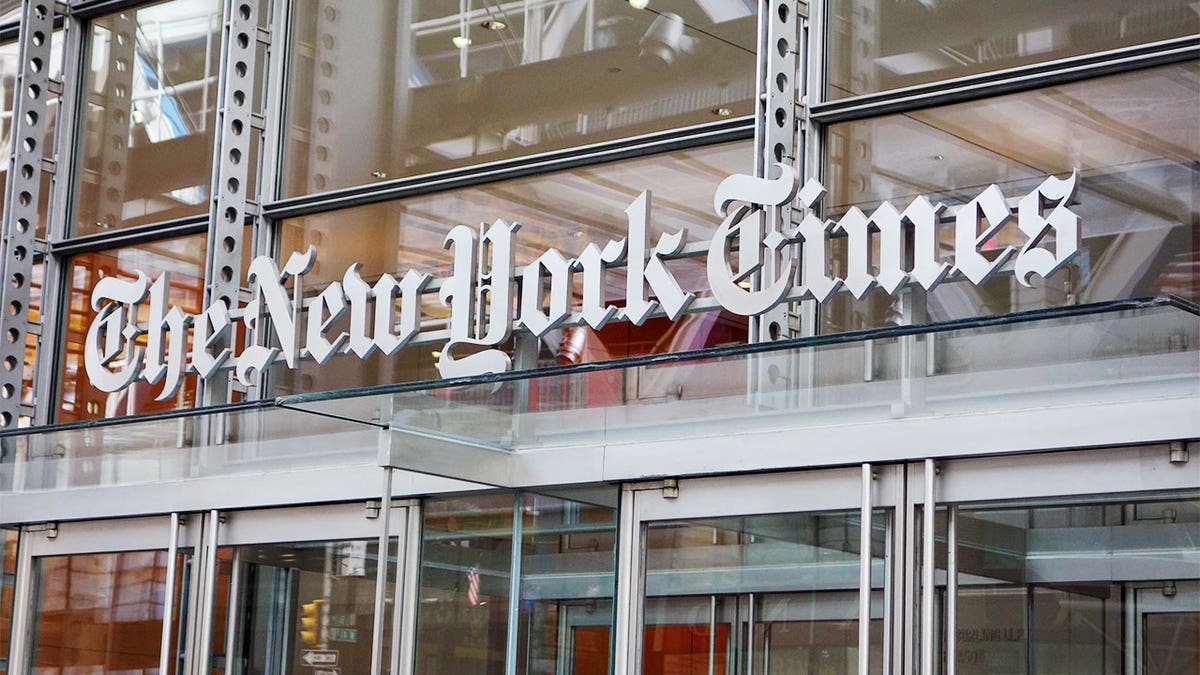
The New York Times building on 8th Avenue in New York City. (DON EMMERT/AFP via Getty Images)
At least 1,100 employees signed the pledge to strike for the 24-hour period.
Times journalists engaged in a strike for less than a day in 1981. A strike in 1978 was the most significant, lasting 88 days and disrupting the paper’s publication. Most recently, in 2018, there was a short walkout to protest the elimination of the copy desk.
Joe Kahn, the executive editor of The Times, said he was disappointed by the walkout, and denied the idea that negotiations between NewsGuild and management had reached a deadlock.
"While the company and the NewsGuild remain apart on a number of issues, we continue to trade proposals and make progress toward an agreement," he said.
The New York Times did not immediately respond to a series of questions including whether management is negotiating in good faith and if the employee review process discriminates against particular groups.









